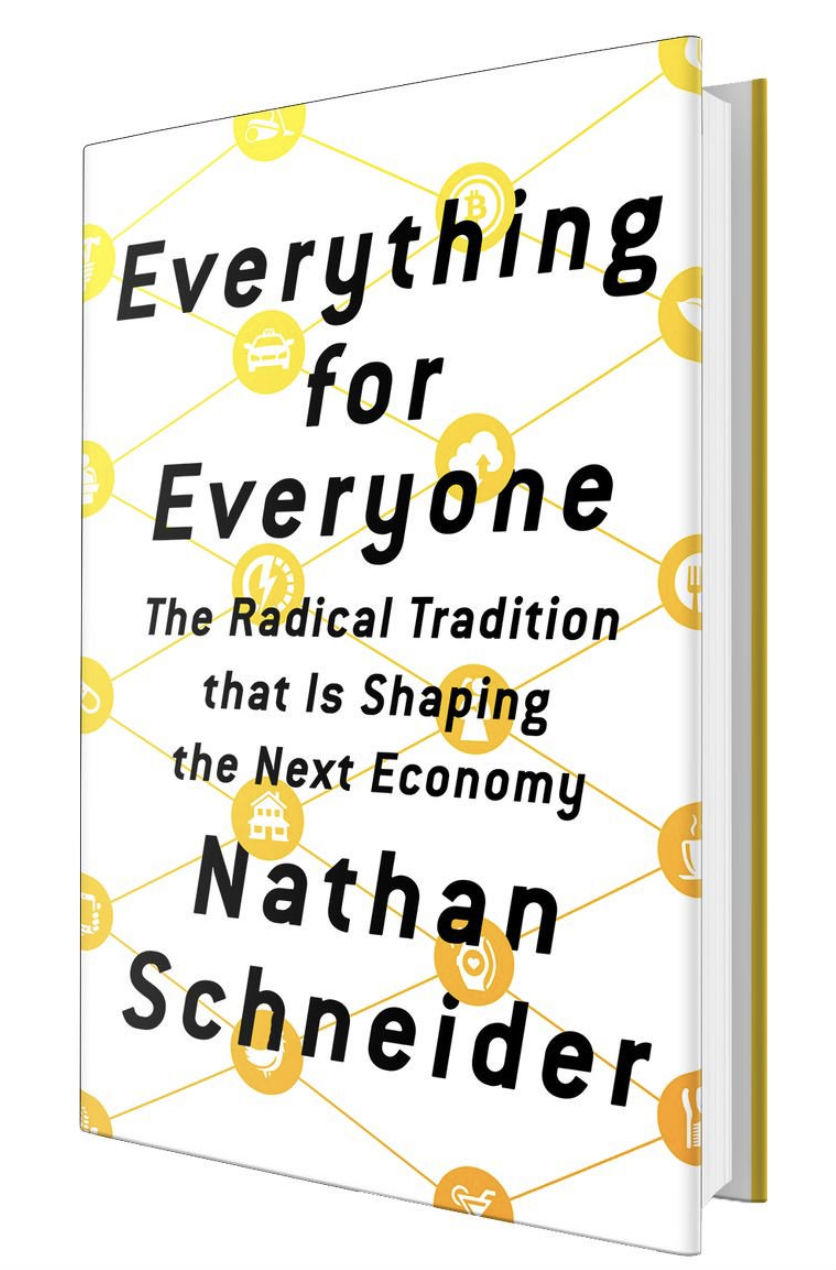Looking Back to Look Forward, Nathan Schneider’s New Book Plumbs the History of Co-ops and Plots the Future of a Democratically Owned and Operated Economy

Reflecting on his life’s work establishing the Mondragon network of cooperatives in Spain, Father José María Arizmendi wrote that cooperativism is often understood as “an economic movement that uses the methods of education.” But Arizmendi found this adage less than satisfying, suggesting it might “be modified to affirm that cooperativism is an educational movement that uses the methods of economics.” Gems like these abound in Nathan Schneider’s new book, Everything for Everyone. Though not as focused on cooperatives in the digital economy as one might expect, Schneider sheds light on an array of emerging collectivist projects and their impact. By mining the history of cooperatives with acute detail, unearthing the hidden-in-plain-sightedness of cooperative economic thinking and action, Everything for Everyone has much to teach us about the present moment. Through co-operative governance, we can carry on the unfinished business of building a genuine democracy. Through co-operative economics, we can create and own a more flexible, more transparent, and more robust economy.
An unwieldy cast of characters and organizations helped the cooperative movement first take hold in the US in the late 19th and early 20th centuries. Leland Stanford, upon founding his namesake university, told his first class of students to think cooperatively as “cooperative societies bring forth the best capacities, the best influences of the individual for the benefit of the whole, while the good influences of the many aid the individual.” Only a few decades before him, Abraham Lincoln discussed how all men should aim to control and own their own labor — that renting oneself out for a wage was on the spectrum of enslavement. Even America’s great depression proved a boon for co-ops. If coops emerge most often where businesses fail to meet demand, then the rise of rural electrical coops across the country in the 1930s should not come as a surprise: citizens banded together to provide themselves a power grid where traditional companies wouldn’t venture. Many of these electrical cooperatives still exist today, though few exercise or even know of their radical, collectivist roots. For his millennial readers, Schneider spells out a simple parallel’ “co‐ops were the original crowdfunding. They were how people got together and financed a business to do things nobody else would do for them.”
Bringing us into today, Schneider details unique cooperative experiments emerging around the world. He visits the ancient caves of Matera, Italy where unMonks have banded together to form an unMonastery. In the same way traditional monasteries carried civilization through the Dark Ages through scholarship and inventions, so too do unMonasteries work to keep alive the possibility of a free, open, and cooperatively organized internet. He documents the successes and shortcomings of the FLOK Society experiment in Ecuador — a government sponsored summit of bureaucrats and hackers aiming to develop free, libre, and open knowledge policies to counter the growing tide of patents, copyrights, and corporate hierarchies. By visiting the Deep South, Schneider helps readers understand the ambitious cooperative political platform of the late Chokwe Lumumba, mayor of Jackson, Mississippi, who died less than a year into his first term in 2014. Kali Akuno, a former advisor to Mayor Lumumba, and his team at Cooperation Jackson have kept this work alive through a host of community projects aimed at launching and supporting worker-owned cooperatives across the city. Their work has gained traction by bringing the cooperative economic model to bear on systemic racial inequities.
Stepping back, what do these suggestive and diverse case studies add up to? The clever revelation that co-ops have been here all along, and their principles and practices are not going anywhere. In fact, co-op thinking is exactly the orientation we need for the present moment. Wharton Professor Jeremy Rifkin makes clear how the model fills an urgent gap: “Even if you didn’t exist,” Rifkin said in a keynote address to an audience of co-ops, “you’re the model we’d have to create.” Schneider too rightly points to the many documented social and economic effects of co-ops: greater resiliency in downturns, higher productivity among workers, improved informaton-sharing and internal communication within an enterprise, leaner start-up costs, the list goes on. Through adages and research, and by unearthing forgotten histories and documenting on-going co-op experiments, Everything for Everyone gives the reader reason to believe that a cooperative economy is not only a compelling alternative, but is already on the way.
How far and how wide this work will expand, however, remains to be seen. Challenges abound. Will co-ops aggressively pursue external capital to help themselves scale, while successfully retaining control and ownership for workers? Can we shift to a new culture of open source and co-designed software that works well, but lacks the glossy perfection of Apple products? How can the legal and policy measures of a select few regions in Europe be adopted by mainstream political parties to support and expand co-ops globally? If our economy is a form of culture, our culture seems rapidly spinning out of control. Our lives are globalized, commodified, and personally and collectively wrung out by a handful of corporate actors aggregating more capital, and concentrating social and political power.
Yet, as the social and environmental consequences of this economic order accelerate — through mass inequality, warming oceans, the decline of basic public infrastructure — the public’s understanding of cooperatives may rapidly evolve too. The cooperative way may soon emerge as our preferred alternative, not by luck, but by necessity. As Everything for Everyone makes expertly clear, such an unfolding would be true to the cooperative form.
Congratulations to Nathan on a great book. We encourage everyone to get their hands on a copy ASAP!